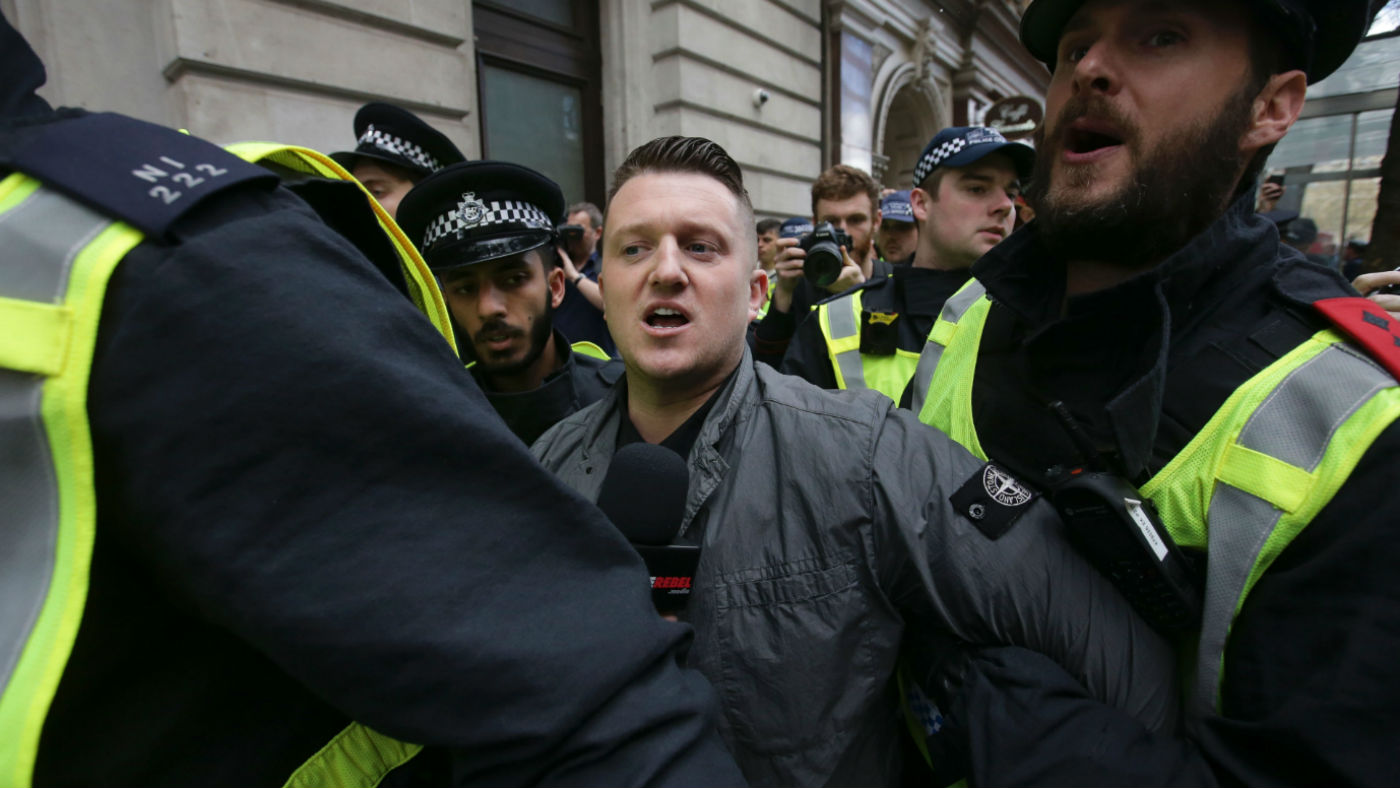Why Tommy Robinson has been banned from Facebook
Far-right activist’s banishment from main social media outlet could drastically reduce his influence

A free daily email with the biggest news stories of the day – and the best features from TheWeek.com
You are now subscribed
Your newsletter sign-up was successful
Far-right activist Tommy Robinson has been permanently banned from Facebook and Instagram for repeatedly posting “dehumanising” and inflammatory content about Muslims.
Both his personal Facebook account and his public page - where he had a following of one million fans - have been shut down with immediate effect. His account on Instagram, which is owned by Facebook, has also been deleted.
In a statement explaining the decision, Facebook said that it strove to balance respect for free speech with its responsibility to protect users from hate speech.
The Week
Escape your echo chamber. Get the facts behind the news, plus analysis from multiple perspectives.

Sign up for The Week's Free Newsletters
From our morning news briefing to a weekly Good News Newsletter, get the best of The Week delivered directly to your inbox.
From our morning news briefing to a weekly Good News Newsletter, get the best of The Week delivered directly to your inbox.
“When ideas and opinions cross the line and amount to hate speech that may create an environment of intimidation and exclusion for certain groups in society - in some cases with potentially dangerous offline implications - we take action.
“Tommy Robinson’s Facebook page has repeatedly broken these standards, posting material that uses dehumanising language and calls for violence targeted at Muslims. He has also behaved in ways that violate our policies around organised hate.”
The English Defence League founder, whose real name is Stephen Yaxley-Lennon, received a final warning from the platform last month, “over posts including one ‘calling Muslims filthy scumbags’ and ‘calling on people to make war on Muslims’”, The Independent reports.
Facebook has been Robinson’s “primary platform for communicating with fans and organising demonstrations”, the newspaper adds, particularly since his ban from Twitter in March last year.
A free daily email with the biggest news stories of the day – and the best features from TheWeek.com
Robinson has a chequered history with the platform, which has enabled him to gain a large online following in international alt-right circles but has also proven something of an Achilles heel.
Last year, he was convicted of contempt of court for broadcasting a Facebook live-stream outside a court hearing a child grooming case.
He was also censured for using the live broadcasting service to falsely accuse a Syrian refugee boy attacked by a fellow pupil at a Huddersfield school of assaulting female classmates.
Robinson “thrives on media attention” and uses his social media presence to present himself as “the victim of a smear campaign designed to keep his views off mainstream outlets”, says The Guardian.
“The decision to ban Robinson from the social media sites could threaten his ability to reach large audiences,” the newspaper adds.
At the time of writing, Robinson’s YouTube account remains active, but the Google-owned platform does not allow ads to appear on his videos, meaning that he does not make money from them.
Another source of revenue was cut off in November 2018, when payment processing service Paypal announced that it would no longer allow Robinson supporters to send him donations.
In response to the news of his Facebook and Instagram ban, Robinson denied that he had done anything wrong, Sky News reports.
“I’ve breached no laws of Facebook,” he said. “What I've done is shown people the truth and that is what they are removing, the truth. People will still find me.”
-
 How the FCC’s ‘equal time’ rule works
How the FCC’s ‘equal time’ rule worksIn the Spotlight The law is at the heart of the Colbert-CBS conflict
-
 What is the endgame in the DHS shutdown?
What is the endgame in the DHS shutdown?Today’s Big Question Democrats want to rein in ICE’s immigration crackdown
-
 ‘Poor time management isn’t just an inconvenience’
‘Poor time management isn’t just an inconvenience’Instant Opinion Opinion, comment and editorials of the day
-
 Switzerland could vote to cap its population
Switzerland could vote to cap its populationUnder the Radar Swiss People’s Party proposes referendum on radical anti-immigration measure to limit residents to 10 million
-
 Epstein files topple law CEO, roil UK government
Epstein files topple law CEO, roil UK governmentSpeed Read Peter Mandelson, Britain’s former ambassador to the US, is caught up in the scandal
-
 Iran and US prepare to meet after skirmishes
Iran and US prepare to meet after skirmishesSpeed Read The incident comes amid heightened tensions in the Middle East
-
 Israel retrieves final hostage’s body from Gaza
Israel retrieves final hostage’s body from GazaSpeed Read The 24-year-old police officer was killed during the initial Hamas attack
-
 China’s Xi targets top general in growing purge
China’s Xi targets top general in growing purgeSpeed Read Zhang Youxia is being investigated over ‘grave violations’ of the law
-
 Panama and Canada are negotiating over a crucial copper mine
Panama and Canada are negotiating over a crucial copper mineIn the Spotlight Panama is set to make a final decision on the mine this summer
-
 Why Greenland’s natural resources are nearly impossible to mine
Why Greenland’s natural resources are nearly impossible to mineThe Explainer The country’s natural landscape makes the task extremely difficult
-
 Iran cuts internet as protests escalate
Iran cuts internet as protests escalateSpeed Reada Government buildings across the country have been set on fire